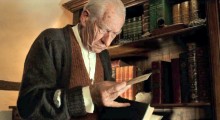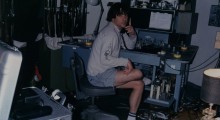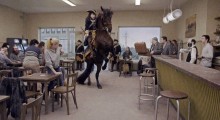Authors — Howard Feinstein
-
Mother Load: Xavier Dolan’s Tom at the Farm

I have the romantic’s weakness for tales of thwarted opportunities in the relationship department. Saddest and most frustrating are those for whom faulty communication, intentional or otherwise, generates the lion’s share of the blame. Ever read Poe’s short story “The Purloined Letter?” It involves theft, blackmail, a woman of royal lineage — it’s opiated Poe, what do you expect? — but we Little People can suffer in our more ordinary ways from the exchange of tainted information. I use the word exchange purposely: The action pains not only the victim, but the perp as well. Quebecois director Xavier Dolan puts […]
by Howard Feinstein on Aug 14, 2015 -
Road “Flic”: Jon Watts’s Cop Car

One day non-discerning encyclopedists will politely dismiss the new top-of-the-line Cop Car. It is Jon Watts’s second low-budget feature (after the spooky 2014 Clown) made prior to his surprise anointment as director of the upcoming Spider-Man “reboot” (Spider-Man: The New Avenger?), which once again visits Peter Parker during his high school years. That angle is off and condescending. It makes perfect sense that Watts was plucked from indie obscurity to run the show for a pull-out-the-stops studio production loaded with stars, not newbies and B-list actors/executive producers; spectacular CGI and highest-tech editing instead of jerry-rigged FX and less sophisticated montage; […]
by Howard Feinstein on Aug 7, 2015 -
Little Things Mean a Lot: Alex R. Johnson’s Two Step

A visibly irritated, middle-aged leader of a small-town criminal syndicate lectures a younger, much more junior member of his band of thugs. The latter has just informed him that he might be able to rustle up a portion of the 10 grand he owes him over the next few days. “I don’t live in a $10,000 world of maybes, Webb,” says the boss, Duane (Jason Douglas). I live in Texas.” (The troubled and troubling sociopath Webb is played by James Landry Hebert, a man who will be going places.) Don’t look for logic in the sage’s upbraiding. The statement is […]
by Howard Feinstein on Jul 31, 2015 -
Fabricated: Petzold’s Astounding Phoenix

Still bearing facial scars from vain attempts to kill her in a concentration camp, the festering infection that followed, and drastic plastic surgery to re-create her (the doctor’s term) in a hospital in her bombed-out hometown of Berlin, the once ravishing Jewish chanteuse Nelly Lenz (Nina Hoss) recklessly saunters out alone into the night to search for the Aryan pianist husband she has not seen since her arrest. Extremely self-conscious, she asks a blind street musician where to even begin looking. Pointedly, he recommends the American sector: That’s where the clubs and the action are. The film’s title is the […]
by Howard Feinstein on Jul 24, 2015 -
Sherlock Sr.: Bill Condon’s Mr. Holmes

We’re not in Victorian London anymore. Mr. Holmes takes place in the British countryside in 1947, two years after the end of World War II. Labor leader Clement Attlee holds the reins of power, and a new, heavily socialized country has begun to emerge from the wreckage of the Blitz. Sherlock is no longer searching for clues to a new case and logically deducing from forensic evidence and observation the course of events leading to a crime and holding the perp accountable. This film is not about the incarnation we are familiar with from Arthur Conan Doyle’s books and innumerable […]
by Howard Feinstein on Jul 16, 2015 -
Pain, Gain: The Sublime Stations of the Cross

How would you transpose 14 sequential artworks on canvas that hail back to the 15th century to contemporary technology and artistic sensibilities? The closest approximation might be a group of photographs, or a film comprised only of a series of fixed shots. Stringing together the individual tableaux would create a slightly disjointed narrative disregarding conventions that have been in effect for sequences for over a century. Even though each shot could stand on its own, there is a flow to the whole. Continuity is implicit, not laid out neatly with eye-line matches, shot-reverse shot set-ups, and cutting from establishing shots […]
by Howard Feinstein on Jul 9, 2015 -
Jazzed: Asif Kapadia’s Amy

When it came to music, Amy Winehouse forcefully played dual roles, as much master as slave. She had a tough time separating the two. As a young teen in the barely middle-class Southgate section of London, she was under strict instructions from older brother Alex, who constantly played music in his room, never to enter without knocking. Otherwise, she said, “He would throw things at you.” One time, however, she could not stop herself, and stormed in without permission. Dumbfounded, he imagined an emergency. “What’s this?” she asked, pointing to his record player. “It’s Ray Charles,” he answered. “’Unchain My […]
by Howard Feinstein on Jul 6, 2015 -
A Matter of Semitics: A Borrowed Identity

What’s in a name? Labeling is a risky proposition. Meant to attract, summarize, or simplify, sometimes all three, a tag’s position front-and-center makes it bait for bashing. Pigeonholing can repel as easily as it entices, or just may harmlessly connote something other than what was intended. In the cultural arena, a title can be artwork-specific and subject-appropriate, only to be slammed, censored, and overruled by the poison of protocol or more overt political and commercial censorship. In theory merely a signifier, it frequently serves as a convenient synecdoche for larger issues under hypocritical attack. Which brings us to Dancing Arabs, […]
by Howard Feinstein on Jun 26, 2015 -
Chronicle of a Dream Foretold: BAMcinemaFest 2015

“Withdrawing in disgust is not the same as apathy,” comments one of the tenuously overlapping characters in Richard Linklater’s 1991 game-changer Slacker. The word itself, fairly recent at the time of production, is a moniker the speaker fully embraces. The branding may sound tactless, if not downright pejorative, but it’s not at all: It implies enough empathy and humanity to seek out options to offset destructive disinterest in matters tangible, ethical, or both. In the creative sphere, the shift in course can lead to an untried M.O. and the models it might generate — if the stars are properly aligned, […]
by Howard Feinstein on Jun 16, 2015 -
Cooed: A Pigeon Sat on a Branch Reflecting on Existence

Powerful imagination and credible spatiality are among the major absences in today’s cinema lamented by Swedish filmmaker Roy Andersson. A compensatory corrective is provided, of course, by his own films, including multiple award-winning commercials and the films in “The Living Trilogy”: Songs From the Second Floor (2000), You the Living (2007), and, just opening in the US, the marvelously wry A Pigeon Sat on a Branch Reflecting on Existence (2014). The movies are assemblages of broad tableaus of relatively short duration, filmed with a static camera. The segments are like an inspired mix of tromp l’oeil, flattened Joseph Cornell boxes, and Gregory […]
by Howard Feinstein on Jun 2, 2015
